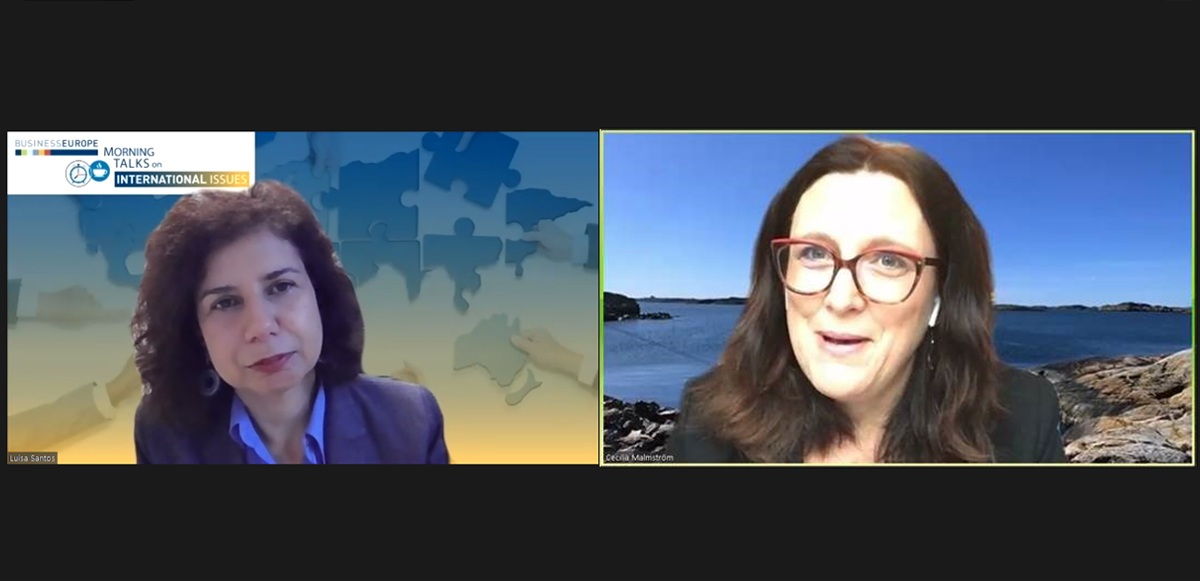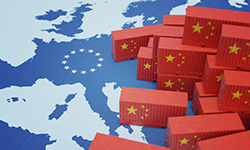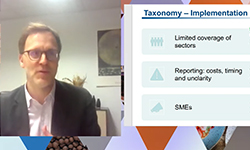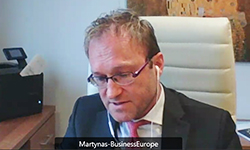BusinessEurope Headlines No. 2021-34
Trade: powerful tool to create jobs and build alliances

The second edition of Morning Talks on International Issues had as guest speaker Cecilia Malmström, former Trade Commissioner and now Visiting Professor at the Goteborg University, to discuss the changing trade and investment landscape and the role of Europe in an increasingly polarised world. During the discussion, Malmström highlighted the important role of trade in fighting the pandemic but also in ensuring a speedy recovery of the world economy, hoping that many of the trade restrictions imposed due to Covid-19 will be temporary. She stressed that trade policy is powerful not only to create jobs but also to build alliances. In this context, trade is one of the tools the EU has to be an important geopolitical player, and not continuing to ratify trade agreements is a big mistake. Regarding the upcoming World Trade Organisation Ministerial (MC12), Malmström recalled how important it is to keep the organisation alive and called on all WTO members to make an effort to achieve a successful outcome at the MC12, as the alternative will be very bad for all.
Contact: Luisa Santos
EU economy is forecast to grow but risks remain
BusinessEurope's Economic Outlook projects the EU economy to grow by 4.8% this year. But as our Chief Economist James Watson explains, behind this overall figure sectors and companies have experienced varying fortunes, and important risks remain from both Covid and inflation.
COP26: analysing the results
Our Adviser for Climate Policy Steffen Engling takes a look at the results – both the promising and the concerning.
Our comment
EU-China relations: where are we?
 We are in one of most difficult moments in EU-China relations from a political point of view. Since sanctions and countersanctions were adopted, the dialogue has been practically non-existent.
We are in one of most difficult moments in EU-China relations from a political point of view. Since sanctions and countersanctions were adopted, the dialogue has been practically non-existent.
Considering the importance of China already today and its further importance in the future, it is in the interest of the EU but also of China to maintain the dialogue. Therefore, we welcome the recent positive steps and the willingness from both sides to hold a political summit still this year.
If we look at the economic side of the relationship, the picture is quite different. China has overcome the USA as our major trading partner last year and the trend seems to continue this year. For the moment, the numbers are not showing any sign of decoupling or even less dependency of the EU from China.
Even if the Comprehensive Agreement on Investment (CAI) is no longer at the centre of EU-China relations, we need to find other avenues to engage, as the challenges are numerous.
- First, we continue to have an unbalanced relationship when it comes to market access. European companies continue to face more problems when trading and investing in China than Chinese companies face in Europe. The Comprehensive Agreement on Investment remains an important tool to mitigate this problem.
- Second, China is adopting policies aimed at increasing local production and investment and favouring decoupling. This is a consequence of the double-circulation policy but also of other actions like data privacy rules or the anti-foreign sanctions law. As a result, it will be more difficult for European companies to serve the Chinese market from Europe.
- Third, China needs to step up ambition on climate change and deliver on its commitments. The COP26 agreement only confirmed the growing gap between the EU’s climate ambitions and the ambitions of our major trading partners including China. If we don’t convince China and others to do more, we will not be able to effectively address climate change and on top we risk seriously undermining EU competitiveness.
- Fourth, the multilateral trading system is going through an existential crisis and China is hugely responsible for some of the reasons behind the crisis but also for the solutions that can be found to address it. China has benefited immensely from its accession to the World Trade Organisation (WTO) and now it needs to engage in finding a solution to reshape it.
- Fifth, Covid-19 has exacerbated existing challenges, for instance the importance of having access to critical materials. China is a leading supplier in many of these materials as we now see with magnesium, essential for many industrial sectors in Europe.
- Sixth, China understands the importance of having strong trade and investment relations with partners in Asia but also in other developing regions like Africa and Latin America. China is increasingly pursuing trade agreements to promote its political and economic interests, e.g.the Comprehensive and Progressive Agreement for Trans-Pacific Partnership (CPTPP) and the Regional Comprehensive Economic Partnership (RCEP). In the meantime, the EU is lagging behind, let’s think about Mexico or Mercosur.
These are ample reasons, and there are more, to continue to engage closely with China but we will have to do it in a different way.
Contact: Luisa Santos
Taxonomy can help green transition if well designed
 “The implementation is challenging and real concerns must be addressed, but if well designed, the EU taxonomy can be an asset to channel private investments into clean solutions and transition efforts”, summarised Deputy Director General Alexandre Affre at the Sustainable Finance event of Cerame-Unie held on 16 November. In his remarks, Affre explained that the taxonomy responds to one of the “how” questions to reach the EU Green Deals’ objectives and can be an opportunity for European companies. “However, there are many conditions to make the taxonomy a successful tool. The challenges posed by the limited scope of covered activities, and the unclear and complex reporting provisions need to be solved”, he noted. In his conclusions, Affre raised concerns on premature reflections on possible taxonomy extensions and references to the Taxonomy in sectorial legislations and EU funding programmes.
“The implementation is challenging and real concerns must be addressed, but if well designed, the EU taxonomy can be an asset to channel private investments into clean solutions and transition efforts”, summarised Deputy Director General Alexandre Affre at the Sustainable Finance event of Cerame-Unie held on 16 November. In his remarks, Affre explained that the taxonomy responds to one of the “how” questions to reach the EU Green Deals’ objectives and can be an opportunity for European companies. “However, there are many conditions to make the taxonomy a successful tool. The challenges posed by the limited scope of covered activities, and the unclear and complex reporting provisions need to be solved”, he noted. In his conclusions, Affre raised concerns on premature reflections on possible taxonomy extensions and references to the Taxonomy in sectorial legislations and EU funding programmes.
Contact: Carolina Vigo
SME Assembly: key moment for reflecting on the way forward
 “In the work ahead, progress on access to finance and avoiding increasing the cost of lending to SMEs will be key”, said Fabrice Le Saché, Chair of BusinessEuope’s Entrepreneurship and SMEs Committee at the SME Assembly in Portoroz, Slovenia, on 16 November. He added that there is also a growing concern about the cumulative effect of existing and incoming legislations at EU level, where the regulatory framework must be carefully designed to avoid excessive burden on SMEs. For example, this is the case in the field of sustainability reporting, where EU legislations (e.g. Taxonomy Regulation, Corporate Sustainability Reporting Directive, Due Diligence, etc.) must take duly into account the specific needs and capacities of SMEs. In this regard, the European Commission must conduct more robust impact assessments of EU regulations on SMEs. “The work is sometimes too fast and not deep enough. Inputs by business shall be taken into account on a more collaborative and operational way”, he highlighted. During the SME Assembly, BusinessEurope also participated in a meeting of the SME Envoy Network where Le Saché stressed that while we assist to a strong recovery in Europe, the situation remains fragile and SMEs are very much exposed. “This is a reason why a nomination of a strong, committed, with entrepreneurial mindset EU SME Envoy, as a crucial interlocutor at the helm of EU SME strategy is needed. The business community is awaiting this for a long time. Now more than ever this post should be filled without further delay”, he concluded.
“In the work ahead, progress on access to finance and avoiding increasing the cost of lending to SMEs will be key”, said Fabrice Le Saché, Chair of BusinessEuope’s Entrepreneurship and SMEs Committee at the SME Assembly in Portoroz, Slovenia, on 16 November. He added that there is also a growing concern about the cumulative effect of existing and incoming legislations at EU level, where the regulatory framework must be carefully designed to avoid excessive burden on SMEs. For example, this is the case in the field of sustainability reporting, where EU legislations (e.g. Taxonomy Regulation, Corporate Sustainability Reporting Directive, Due Diligence, etc.) must take duly into account the specific needs and capacities of SMEs. In this regard, the European Commission must conduct more robust impact assessments of EU regulations on SMEs. “The work is sometimes too fast and not deep enough. Inputs by business shall be taken into account on a more collaborative and operational way”, he highlighted. During the SME Assembly, BusinessEurope also participated in a meeting of the SME Envoy Network where Le Saché stressed that while we assist to a strong recovery in Europe, the situation remains fragile and SMEs are very much exposed. “This is a reason why a nomination of a strong, committed, with entrepreneurial mindset EU SME Envoy, as a crucial interlocutor at the helm of EU SME strategy is needed. The business community is awaiting this for a long time. Now more than ever this post should be filled without further delay”, he concluded.
Contact: Daniele Olivieri
Strengthening the EU recovery
 Wage growth moderation and high vaccination levels will be key to maintaining the EU recovery, according to BusinessEurope's Economic Director, James Watson. Speaking at the online event “How Robust is the EU recovery”, organised by the think-tank CEPS, on 15 November, James noted that the major risks to the outlook stemmed from rising inflationary pressures and increasing hospitalisations linked to Covid. Drawing on our Autumn Economic Outlook, James noted that with 4.8% growth forecast for the EU this year, the recovery has been strong, despite supply chain shortages constraining many parts of manufacturing industry and some service sectors continuing to operate below capacity in response to ongoing Covid related concerns. Watch the recording of the event.
Wage growth moderation and high vaccination levels will be key to maintaining the EU recovery, according to BusinessEurope's Economic Director, James Watson. Speaking at the online event “How Robust is the EU recovery”, organised by the think-tank CEPS, on 15 November, James noted that the major risks to the outlook stemmed from rising inflationary pressures and increasing hospitalisations linked to Covid. Drawing on our Autumn Economic Outlook, James noted that with 4.8% growth forecast for the EU this year, the recovery has been strong, despite supply chain shortages constraining many parts of manufacturing industry and some service sectors continuing to operate below capacity in response to ongoing Covid related concerns. Watch the recording of the event.
Contact: James Watson
European standardisation: from dialogue to practical changes
 “The European standardisation system remains a key element to facilitate innovation and state-of-the-art standards that reflect the most recent technological advancements on the European and global markets”, said BusinessEurope Director for Internal Market Martynas Barysas at the workshop “Timely delivery of European standards for a Green, Digital, Single & Global Market”, jointly organised by the European Commission, CEN CENELEC and the European Telecommunications Standards Institute on 16 November. The event aimed at informing stakeholders on the work of the joint task force established by the Commission and European standardisation organisations to address bottlenecks in standardisation processes and to facilitate the quick adoption of standards defined as crucial, as well as to gather stakeholders’ input and ideas for its future work. Barysas added that the task force should have three main objectives: 1) preserve the strengths of the European Standardisation System; 2) Solve current bottlenecks in standardisation processes (i.e., Harmonised European Standards) and finally 3) anticipate standardisation priorities by leveraging industry expertise and aligning with ongoing international standardisation activities. Read our joint industry recommendations to restore effective harmonised standardisation and our comments on the incoming standardisation strategy.
“The European standardisation system remains a key element to facilitate innovation and state-of-the-art standards that reflect the most recent technological advancements on the European and global markets”, said BusinessEurope Director for Internal Market Martynas Barysas at the workshop “Timely delivery of European standards for a Green, Digital, Single & Global Market”, jointly organised by the European Commission, CEN CENELEC and the European Telecommunications Standards Institute on 16 November. The event aimed at informing stakeholders on the work of the joint task force established by the Commission and European standardisation organisations to address bottlenecks in standardisation processes and to facilitate the quick adoption of standards defined as crucial, as well as to gather stakeholders’ input and ideas for its future work. Barysas added that the task force should have three main objectives: 1) preserve the strengths of the European Standardisation System; 2) Solve current bottlenecks in standardisation processes (i.e., Harmonised European Standards) and finally 3) anticipate standardisation priorities by leveraging industry expertise and aligning with ongoing international standardisation activities. Read our joint industry recommendations to restore effective harmonised standardisation and our comments on the incoming standardisation strategy.
![]()
![]() Contact: Adnane Lachheb
Contact: Adnane Lachheb
Calendar 
- 22-25 November: CONCORDi 2021- Industrial innovation for competitive sustainability
- 23-25 November: EU Open Data Days - Shaping our future with open data
- 26 November: BusinessEurope Council of Presidents
- 29 November: Employers4Reforms: Sustaining pensions systems in line with employment and demographic trends
- 30 November - 3 December: Twelfth WTO Ministerial Conference
- 1 December: Reinventing Greece through Investments in Innovation
Not yet a subscriber? Register here.
Reminder: please have a look at our privacy policy